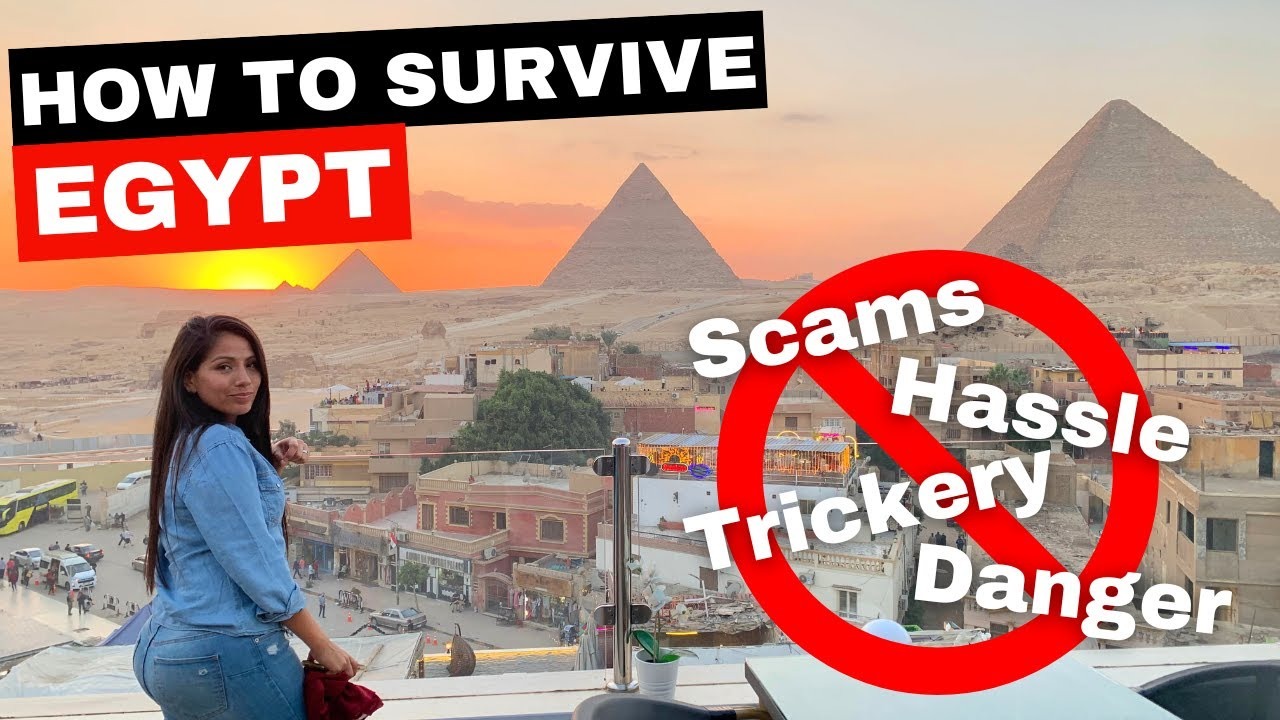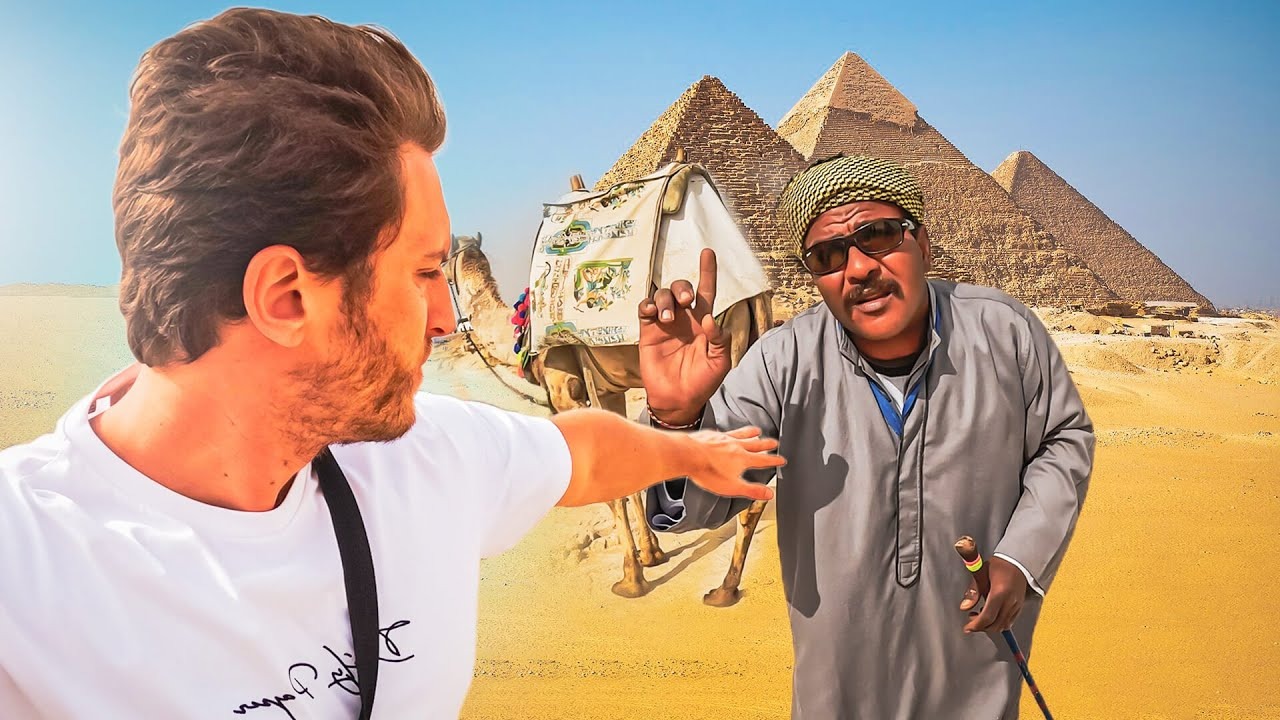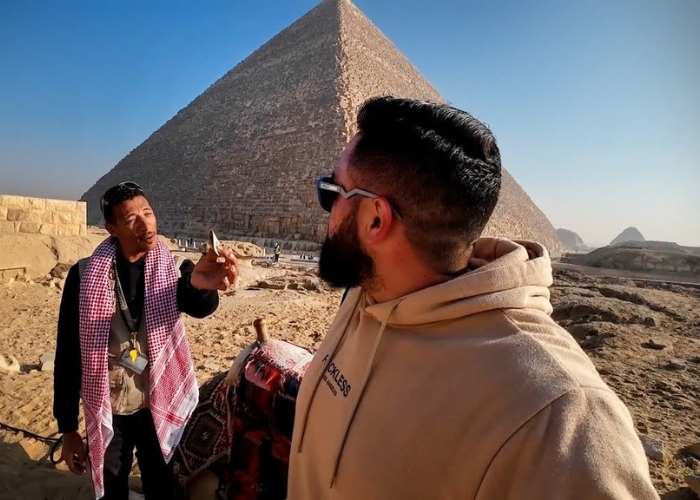Tourist scams in Egypt are one of the most talked-about concerns among travelers planning a trip to this historic destination. From the Pyramids of Giza to Luxor, Aswan, Dahab, and Sharm El Sheikh, the mix of breathtaking sights and bustling tourist hubs sometimes attracts opportunists looking to make quick money. While millions of people visit Egypt safely every year, forums like Scams in Egypt Reddit highlight common tricks that catch first-time travelers off guard. Whether it’s pyramid scams in Egypt involving camel rides, overpriced souvenirs, or Cairo airport scams targeting arrivals, being informed helps you enjoy your journey stress-free. This guide provides everything you need to know about avoiding scams in Egypt, spotting tricks before they happen, and ensuring your holiday stays memorable for the right reasons.
Common Tourist Scams in Egypt
When exploring Egypt’s most famous attractions, you’ll likely encounter situations where locals approach you with offers that sound too good to be true. The most common scams in Egypt include pyramid camel rides where the handler initially asks for “just one dollar” but demands large sums once you’re on the camel. There are also worthless coins scams where sellers push foreign travelers to buy old-looking but valueless coins, calling them “treasures of the pyramids scam-free” or even “coins of Egypt scam-free.” Street guides may insist on showing you “secret areas” at temples or pyramids, only to request large tips later.
Another widespread trick involves exchange money in Egypt with unofficial dealers who offer inflated rates but then shortchange tourists with fake or outdated notes. Vendors sometimes also sell low-quality papyrus or perfumes, advertising them as genuine artifacts or luxury goods.
At Cairo and Giza, Egypt pyramid scams often involve pushy sellers who won’t leave until you buy something. In Luxor, scammers may offer boat rides or tours at suspiciously low prices, only to abandon travelers mid-journey or increase the price once underway. Even in coastal resorts like Sharm El Sheikh scams or Dahab scams can occur through overcharging for diving trips or faulty equipment rentals.
Travelers often ask: “Is Egypt safe to travel?” Yes, Egypt is generally safe, but awareness is key. Recognizing these Egypt tourist scams ensures you won’t be scammed in Egypt. By being cautious yet polite, you can navigate these situations while still enjoying the warmth of Egyptian hospitality.
Pyramid Scams in Egypt and Giza Tricks

The Pyramids of Giza are the heart of Egypt’s tourism industry but also the main stage for Egypt pyramid scams. Camel and horse rides are notorious; handlers start with offers of “cheap rides” then demand inflated payments, sometimes refusing to let you down until you pay more. Pyramid horses can also be rented under misleading agreements where extra “fees” suddenly appear for photos, water, or even the return journey.
Another trick is the Egypt camel scam, where someone takes your photo with a camel and then insists you pay. Some guards at the pyramids may unofficially ask for “tips” to let you climb or enter restricted sections, even though it is not permitted. Fake guides claiming to be “official” often approach tourists at the entrances, promising to reveal hidden tombs or “crown of Egypt scam-free” experiences. These usually end with excessive tipping demands.
Shops around Giza sometimes sell counterfeit relics or jewelry, marketed as rare items such as the “Egyptian king scam-free” or “lady of Egypt scam-free,” which have no historical value. Meanwhile, taxi drivers may pretend that certain entrances are closed, redirecting you to friends’ shops for commissions.
Travelers also worry: “Is Giza dangerous?” In reality, Giza is not dangerous, but it can be overwhelming with the number of pushy sellers and scammers. With preparation, awareness, and polite refusals, you can avoid these issues. Many seasoned travelers share their stories on Scams in Egypt Reddit to warn others, which makes it clear that avoiding scams in Egypt is mostly about knowing what to expect. By sticking to licensed guides and official entry tickets, you’ll enjoy the pyramids without falling into traps.
Crown of Egypt — scam-free
If you’re looking for a genuine Crown of Egypt (or a product/experience named that) and want reassurance it’s scam-free, focus on trust signals and clear verification steps. A scam-free offering will provide transparent provenance, verifiable documentation, and straightforward customer protections. Before you buy or promote anything labelled Crown of Egypt, check for:
-
Provenance & documentation: clear history, certificates of authenticity, serial numbers, or lab reports for valuable items.
-
Reputable seller: long-standing business address, verifiable phone number, real customer reviews (not all 5★ posted the same day), and presence on trusted marketplaces.
-
Secure payments: HTTPS site, payment through recognized gateways (credit card, PayPal, escrow for high-value purchases). Avoid wire transfers to unknown accounts.
-
Returns & guarantees: visible refund/return policy and warranty; an honest seller offers easy contact and a clear process.
-
Independent verification: third-party appraisals, museum/archaeological institution references, or customs/import paperwork when relevant.
Practical tip: if a deal looks too-good-to-be-true (huge discount, pressure to act immediately, or requests for unusual payment), treat it as suspicious. Document all communications and use a payment method that offers dispute resolution.
Egyptian King — scam-free
Whether “Egyptian King” is a brand, collectible, tour, or digital product, a scam-free experience centers on transparency, accountability, and third-party validation. To ensure the Egyptian King offering is legitimate, evaluate these elements:
-
Clear branding & legal info: registered company name, VAT/tax number (if applicable), and public business records or trade registrations.
-
Authentic imagery & descriptions: high-quality photos, matching product details, and no reused stock photos presented as unique items.
-
Customer evidence: independent reviews, testimonials with dates and verifiable profiles, and social proof across multiple platforms.
-
After-sales support: reachable customer service, clear warranty, and a timely refund/repair policy.
-
Safety measures for tours/experiences: licensed guides, permits for protected sites, well-documented itineraries, and health/safety protocols.
If you plan to sell or promote “Egyptian King” products/services, add trust-building elements: money-back guarantee, certificate of authenticity, clear shipping/tracking, and a transparent privacy policy. These reduce buyer anxiety and make the offer convincingly scam-free.
Luxor Scams and Nile Valley Tricks
Luxor, known as the world’s greatest open-air museum, is filled with temples, tombs, and enthusiastic locals. Unfortunately, Luxor scams target visitors who may be overwhelmed by the grandeur. One of the most frequent scams involves boat rides across the Nile. Someone offers a cheap crossing, but midway, the price doubles, or the boatman abandons you unless you pay extra.
In markets near Karnak and Luxor Temple, vendors sometimes sell fake antiquities or low-quality papyrus scrolls, pretending they are ancient treasures. Travelers report Egypt scammers who offer to guide them “for free” around temples, then demand money afterward. Taxi drivers may exaggerate distances, taking longer routes to inflate fares.
Tourists also ask: “Is Luxor dangerous?” While Luxor is generally safe, these scams make some visitors feel uneasy. Awareness is the best tool. Forums discussing scams in Egypt Reddit often highlight how new arrivals feel pressured, particularly around busy tourist areas. Always agree on prices before boarding a boat or taxi, and don’t accept “free” help unless you’re prepared to tip generously.
Some scams also exploit cultural misunderstandings. For instance, vendors may give you a small item as a “gift,” then insist on payment once you accept it. This creates an awkward situation, especially for those unfamiliar with local bargaining customs.
In truth, Luxor remains one of the most captivating places in Egypt. By avoiding scams in Egypt with simple strategies—booking tours with reputable agencies, asking hotel staff for advice, and handling interactions with calm confidence—you’ll experience Luxor’s wonders without hassle.
Sharm El Sheikh and Dahab Scams
Egypt’s Red Sea resorts are famous for diving, snorkeling, and relaxation. But even paradise has its share of opportunists. Scams in Sharm El Sheikh often involve overpriced diving trips. Tour operators may advertise low-cost packages, then charge hidden fees for equipment, boat fuel, or “permits.” The same applies to Dahab scams, where tourists renting diving gear sometimes discover the equipment is faulty or overcharged.
Another trick in Sharm involves taxi scams. Drivers may claim their meter is broken and demand inflated fares. Some will also insist that “fixed prices” are standard for foreigners, which is untrue. Tourists often wonder: “What should I be careful of in Sharm El Sheikh?” The main advice is to confirm prices upfront and stick with trusted operators.
Beach scams also happen. Vendors might offer free samples of food, shisha, or massages, only to demand payment afterward. In Dahab, some scams involve “guided desert tours” where the guide vanishes mid-way or provides a substandard experience compared to what was promised.
Despite these issues, both Sharm and Dahab are very safe for tourists. The government has invested heavily in security, and millions of travelers enjoy carefree vacations here. The scams are usually petty and avoidable with awareness. Whether dealing with Egyptian scammers or just overpriced services, remember that politeness and firmness go a long way.
The Red Sea resorts remain incredible for underwater adventures and cultural experiences. By reading accounts like those on Scams in Egypt Reddit, you’ll recognize common tricks and enjoy your time without worry.

Cairo Airport Scams and City Hustles
Arriving in a new country can make tourists vulnerable, and Cairo airport scams are notorious. Unofficial taxi drivers often approach arrivals, offering rides at inflated prices or claiming hotels are closed to redirect you to other accommodations. Always use official airport taxis or pre-book transfers through trusted agencies.
Some Cairo Egypt scams also involve luggage porters who carry your bags and then demand excessive tips. At times, calls from Egypt scams target foreigners even before they travel, with scammers pretending to be tour operators or hotel staff.
Within the city, fake guides approach tourists at the Egyptian Museum or historic mosques, offering services without licenses. Vendors may also sell counterfeit tickets or charge extra for entry to “special areas.” In markets, some sellers use high-pressure tactics to make tourists feel obligated to buy.
Travelers often ask: “Is Cairo safe for Americans?” and “Is it safe for Americans to go to Egypt?” The answer is yes, Cairo is safe overall, but awareness is essential. Simple precautions like using hotel-recommended taxis, refusing unsolicited help, and paying attention to change when exchanging money make a big difference.
Tourists sometimes worry about safety: “Is Egypt safe to visit now?” The reality is that Egypt is safe to travel, but scams are part of the local tourism culture. Recognizing the difference between genuine hospitality and pushy scams helps visitors fully enjoy the treasures of Cairo without stress.
Is Egypt Safe? Myths, Realities, and Avoiding Scams
The question “Is Egypt safe?” is asked by nearly every traveler. Safety concerns are often confused with petty scams, but the truth is that Egypt is one of the world’s most visited destinations and generally safe. Millions of tourists explore without serious issues, but scams remain a common annoyance.
Egypt scammers thrive on misinformation. By reading traveler accounts of being scammed in Egypt—from camel rides at the pyramids to misleading taxi fares—you can prepare yourself. While scams might create frustration, they rarely pose physical danger.
Tourists often wonder: “Is Egypt safe to travel?” or “Is it safe to visit Egypt now?” The answer depends on awareness. Knowing about common tourist scams in Egypt ensures smoother travels. Whether it’s Egypt pyramid scams, Luxor scams, or Dahab scams, recognizing the signs is key.
For Americans asking “Is Cairo safe for Americans?” or “Is it safe for Americans to go to Egypt?”—yes, Egypt is safe for Americans, Europeans, and travelers worldwide. The key lies in preparation. Always use trusted agencies, avoid unsolicited offers, and treat strangers’ “free gifts” with caution.
Ultimately, scams exist in every country, but Egypt’s rewards far outweigh the risks. With a mindset focused on avoiding scams in Egypt, you’ll enjoy experiences like sailing the Nile, exploring the pyramids, and diving in the Red Sea without worry. By understanding these realities, you’ll be able to embrace the magic of Egypt while sidestepping the pitfalls.
Conclusion
Traveling through Egypt offers unforgettable moments, from the treasures of the pyramids scam-free to the wonders of Luxor and the Red Sea. While Egypt scams exist—ranging from Cairo Egypt scams to pyramid scams Egypt and even petty tricks in Sharm El Sheikh or Dahab—awareness ensures your safety. Millions visit every year, proving that Egypt is not only safe to travel but also deeply rewarding.
Whether your concern is “is Egypt safe to travel?” or “what should I be careful of in Sharm El Sheikh?” the answer lies in staying alert and informed. By recognizing scams before they happen, you won’t just avoid being scammed in Egypt—you’ll also enjoy an authentic, hassle-free journey.

